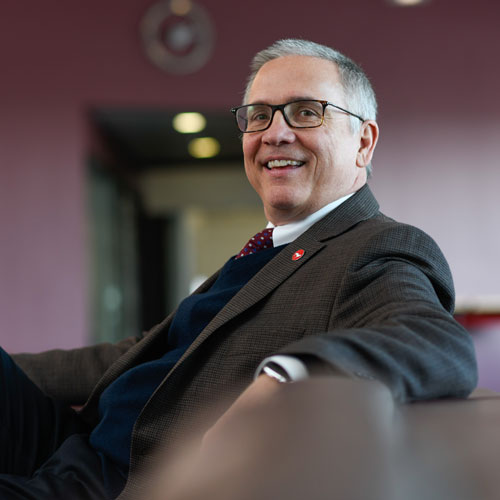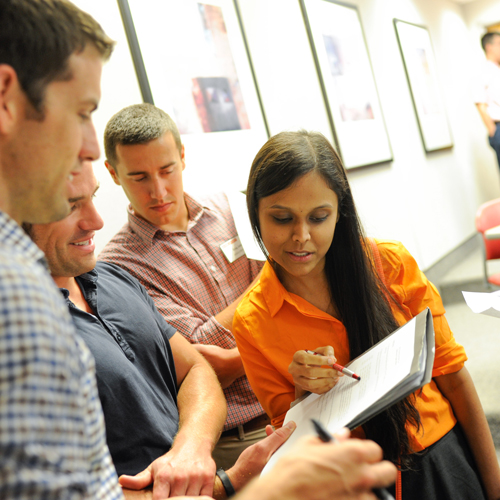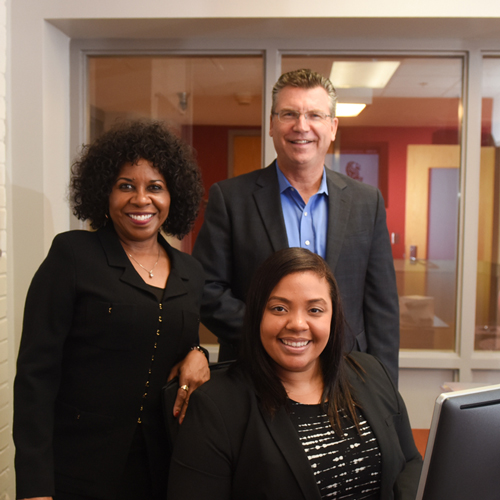
MBA Consulting Practicum Drives Success for Clients and Students
The Consulting Practicum in the Jenkins MBA Program has an overarching objective: to drive success for both the student consultants and their clients in a wide range of businesses and industries.
Since fall 2017, when the practicum was launched, 111 students in the Jenkins Professional Online and Evening MBA students have worked, primarily in virtual teams, with 48 local and global organizations in the Jenkins MBA Program’s diverse partner base. Their clients have included both early stage and established firms and non-profits, in brewing, technology, manufacturing, service, transportation and other industries. All were seeking help with questions faced by many companies, including: How can I expand my business in the US? What is the best way to enter the international market, including in what country? How do I grow my non-profit and ensure its sustainability?
“The practicum experience fulfills an experiential learning requirement for students in the NC State Jenkins MBA Program, while also providing consulting services for local and global organizations,” said Leigh Shamblin, director of leadership at Poole College and professor of practice. She is the college’s lead faculty contact for companies seeking to participate in the practicum course, and also serves as faculty mentor for the student teams as they help clients with real business challenges and market opportunities.
 North Carolina Small Business and Technology Development Center (NC SBTDC) located on NC State University’s Centennial Campus.
North Carolina Small Business and Technology Development Center (NC SBTDC) located on NC State University’s Centennial Campus.
“The SBTDC is a primary partner in North Carolina’s overall economic development infrastructure and the effective bridge between the state’s small businesses and the University of North Carolina system,” said Ginny Vaca, an international business development counselor at SBTDC. “Our goal is to leverage the vast resources of the UNC system, including student and faculty talent, to improve small business outcomes,” she said.
Vaca has been connecting client companies with students in the Jenkins MBA consultancy practicum course for nearly three years. “With an average of four projects in each of the three semesters – fall, spring and summer – the SCTDC has connected nearly 40 clients with Jenkins MBA teams,” she said, noting that students sign the SBTDC’s Standards of Conduct memo which includes client confidentiality.
“It is a win/win experience for all involved, as the client receives valuable information; students gain knowledge about consulting, using tools learned in the consultancy course; and I (as advisor) learn from all involved,” Vaca said. “The process is very professional, respectful and cooperative as we all try to reach the common agreed-upon goal. Professor Shamblin participates in some of the sessions and presentations, also offering good advice.”
A Platform for Success
The Jenkins MBA Consulting Practicum teams follow a process that helps assure both students and clients stay informed and on track. That process includes:
- An initial contracting meeting to set expectations for the team and the client
- An initial contracting meeting to set expectations for the team and the client
- A project charter and work plan, created collaboratively by the student team and client, to establish meeting schedules, create a project description, and identify objectives and deliverables
- A situational analysis to establish the business context within which the problem or issue is being addressed
- Weekly or bi-weekly meetings where teams report on progress, receive feedback, and discuss new goals and adjustments to the initial contract and project charter
- Mid-term and final presentations and an action plan that provides a roadmap for the company to implement recommendations.
Help with a Vexing Question: Lease or Buy?
Will Newton, president of Trimm, Inc., tapped the Jenkins MBA Consulting Practicum for help with a financial viability study. He knew of the practicum course through prior work with Mike Siebert, NC SBTDC regional director.
“I wanted to lean on the expertise of the students and the professors at NC State to help with a difficult-to-define issue I believed many business owners face,” Newton said. That issue, he said, was whether to own and or lease space for a business. “It would be good to come up with a process and criteria to help guide the decision,” he said.
MBA students James Shaw and Anthony Sledge worked with Newton to develop a checklist for use when trying to answer the questions:
- Should I invest in a piece of property for my business or should I continue to lease?
- If purchasing, what issues should I consider when making the decision?”
“The key takeaway for me was that it would be best to invest in a property,” Newton said, adding that he had a good experience with the consulting team. “I’d tell anyone considering going into this program to be clear on the deliverable they want at the end of the process, so everyone has the same expectations.”
Actionable Guidance for Going Global
Steve Janz, vice president of international sales for Flow Sciences, Inc., is one of several companies that came to the practicum with another question faced by many businesses – how to enter an international market.
Janz had worked with the SBTDC team in the past, and Vaca suggested he work with an NC State MBA team to explore how Flow Sciences, which sells equipment for pharmaceutical manufacturers, could partner with pharma companies in India.
“One of the things we like about working with the university is that they (students) can take some guidance and give us a deliverable that is actionable,” Janz said. “It doesn’t sit on a desk somewhere; we squeeze as much juice out of it as we can,” noting that a report completed this past spring has already led to conversations with a company in India.
One of the things we like about working with the university is that they (students) can take some guidance and give us a deliverable that is actionable.
The students drew on market research and applied other classroom learning to the project. “It was a perfect fit,” he said. The team produced a template that could be used with potential partners in various countries. At the same time, the project provided the MBA students experience and knowledge they can use with future projects.
One of those students was Eric Templeton, an engineer officer in the U.S. Marine Corps. In that role, he said, “I essentially act as a consultant for USMC commanders, and saw value in participating in this course.”
He and team member Christina Dolan outlined a specific targeting strategy for Flow Sciences’ B2B sales in India’s pharmaceutical manufacturing industry, including identifying specific targets and methods of assessing for potential customer acquisition.
Dolan said she had selected the consulting option because it “seemed like a great way to tackle a real problem for a company. I would love to be a consultant later in my career, so the knowledge I have learned through this experience is valuable.” That insight included understanding differences in deals, trading and consumer preference.
They provided the following key takeaways from their consulting project.
- Communication and flexibility were key to our success as a team. It is critical to quickly identify exactly what the client wants. Don’t beat around the bush. Be direct and strategic in client communication.
- Always go into meetings prepared to ask pointed and specific questions with the goal of informing and driving decision making.
- If the team is spending valuable time with the client on issues or topics that do not help inform or drive a decision point, you need to go back into problem framing and further develop the need and motivation.
Thomas Jennings, a digital marketing consultant and Jenkins Professional Online MBA student, said that he saw the consulting course as “a way to gain additional real world experience that I could leverage to the benefit of my own business (in digital marketing).”
The MBA program complemented my real world experience with some great instructional materials, as well as the wealth of consulting experience the teachers were able to provide from their own consulting projects
For the practicum course, his team worked with a company that was exploring new international markets as a potential entry point for new business strategies. “Our goal was to identify potential new markets and barriers to entry, as well as to provide next steps for follow-on business activities,” Jennings said.
He drew on his own experience as a digital marketing consultant for his team project. “The MBA program complemented my real world experience with some great instructional materials, as well as the wealth of consulting experience the teachers were able to provide from their own consulting projects,” he said.
“In today’s world, everyone is a consultant,” Jennings added. “Classes like this are an opportunity you cannot afford to miss. They will give you real world skills that will aid you in job searches, interviews, client interactions, as well as provide you with skills to negotiate your own projects within your company.”
Tanner Baxley worked with Practicon, which is exploring entering the Mexican market. The students’ role was, “synthesizing useful information and researching facts that are important to the company, using fundamental consulting practices outlined by Peter Block in ‘Flawless Consulting’,” Baxley said.
 His primary reason for choosing the consulting course was the opportunity it provided “to enhance technical and interpersonal skills that will allow me to help others achieve their goals. The ability to influence others to make smarter decisions is transferable to many different real-world situations,” he said.
His primary reason for choosing the consulting course was the opportunity it provided “to enhance technical and interpersonal skills that will allow me to help others achieve their goals. The ability to influence others to make smarter decisions is transferable to many different real-world situations,” he said.
Baxley also is building on skills gained as an undergraduate engineering student at NC State.
“I have had an interest in business since my undergraduate time at NC State,” he said. “During my senior year, I was exposed to the customer-facing side of biomedical engineering as a part of my senior design program. This was the first time I realized how exciting business is when focused on improving someone else’s life. I enjoyed my time so much as an undergraduate at NC State that the Jenkins MBA Program was a natural first choice for me,” he said. He is on track to complete the Jenkins MBA Program in spring 2021, while continuing to work full time.
Experiences gained through the consulting course, he said, have helped him to build useful skills for communicating with clients and customers. “They have helped me understand the importance of using keen observation skills to pin down specific needs and a way to meet those needs. From my MBA courses so far, I am drawing on courses like MBA 580: Creating Value in Organizations, to apply useful frameworks to the analysis of business situations and competitive landscapes.”
They have helped me understand the importance of using keen observation skills to pin down specific needs and a way to meet those needs.
Her team’s goal was “to help the company decide if and how it can distribute its product into a new international market,” Byers said. She drew on her corporate finance, business relationship management and product management courses to help guide her research and recommendations for the project. She also noted that, “It has been amazing to see how (her team members and her own) different talents and experiences have merged together to make this project successful.”
Buddy Everhart, Aviator Brewing Company’s chief financial officer who has worked with NC State Poole College student teams on other projects, said, “The greatest takeaway from this particular engagement has been the depth of thought and research conducted by the student team members. They have taken the assignment and have done a tremendous job of looking at the high level view and digging down into the details in order to present as comprehensive a view of a foreign market analysis as is possible.
“It has been a pleasure working with the students in previous engagements and I personally enjoy interfacing with the students to discuss the intricacies of the brewing industry. Any time that the NC State Poole College of Management would like to utilize us for a class project, we would definitely be open to assisting.
Non-Profit Sector
Francis Gradisher and Jillian Baldwin worked with an organization that was new to the consultancy course – a non-profit with limited staffing that sought to become more efficient and to grow more sustainably.
“We were able to create an ecosystem, to explain to the company the environment they operated in and how to navigate it,” Gradisher said. The student team applied tools learned through their MBA studies, including PESTLE, SWOT, Feedback and Appraisal Systems, and Porter’s 5 Forces. They also focused on providing processes that could be easily maintained by the client with its current staffing level.
For other students considering this course, Byers said: “Do it! This course will enable you to gain insight and knowledge that will help shape your resume.”












View Comments 0